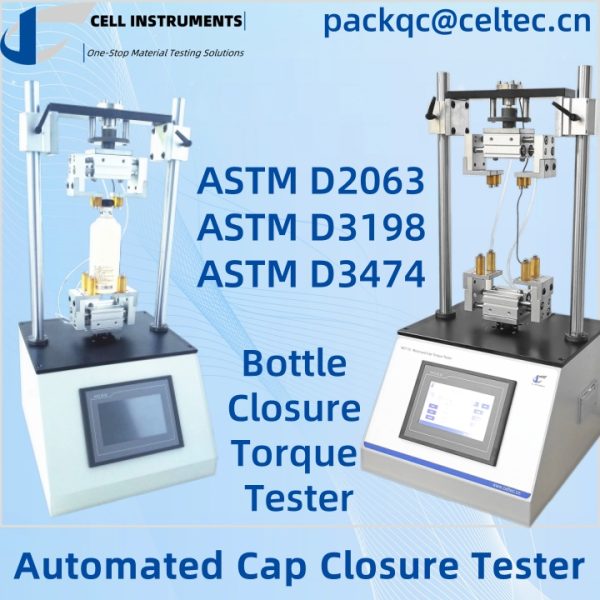Best Automated Cap Closure Tester Top Features to Look
Introduction
In today’s competitive market, ensuring product quality and safety is paramount. An automated cap closure tester is a critical tool for industries such as packaging, pharmaceuticals, beverages, and cosmetics. This article explores the significance, features, and applications of automated cap closure testers, with insights into compliance with standards like ASTM D2063, ASTM D3198, and ASTM D3474.
The Importance of Automated Cap Closure Testers
Automated cap closure testers play a crucial role in maintaining the integrity of products by ensuring that caps are neither too tight nor too loose. Proper torque levels are essential for preventing leaks, contamination, and ensuring ease of opening. These testers are indispensable in industries where product safety and quality are non-negotiable.
Key Features of Automated Cap Closure Testers
Automated cap closure testers come equipped with advanced features designed to enhance accuracy and efficiency. Key features include:
- PLC Controlled Unit: Ensures industrial-level stability with an intuitive HMI touch screen interface.
- Auto Clamping and Rotating Capability: Simulates a production line environment, enhancing real-world applicability.
- Measurement of Locking and Opening Forces: Provides comprehensive data on cap performance.
- Automatic Peak Value Retention: Captures the highest torque value for accurate assessment.
- Upper and Lower Dual Pneumatic Clamping Mechanisms: Secures various cap sizes and types firmly during testing.
- Automatic Rotation Functionality: Streamlines the testing process, allowing for consistent results.
- Micro Printer: Facilitates effortless data recording for quality control documentation.
- Multiple Units of Measurement: Displays results in Kgf.cm, N.cm, daN.cm, Inch.lbs, and N.m for versatility.
- Overload Protection and Auto-Zeroing Function: Enhances safety and accuracy.
- RS232 Port and Professional Computer Software (Optional): Allows for advanced data analysis and integration with other systems.
Test Methods
Automated cap closure testers employ various test methods to ensure comprehensive evaluation of cap performance. These methods include:
- Application Torque Test: Measures the force required to apply the cap.
- Removal Torque Test: Measures the force required to remove the cap.
- Application/Removal Torque Test Cycle: Tests the cap through multiple application and removal cycles to ensure durability.
Compliance with ASTM Standards
Ensuring compliance with industry standards is critical for maintaining product quality and safety. Key ASTM standards relevant to cap closure testing include:
- ASTM D2063: Defines procedures for measuring the torque retention of continuous thread closures.
- ASTM D3198: Specifies methods for measuring the application and removal torque of threaded or lug-style closures.
- ASTM D3474: Offers guidelines for the calibration and proper use of torque meters in packaging applications.
Applications Across Industries
Automated cap closure testers are utilized across various industries to maintain product integrity and safety. Key applications include:
- Packaging: Ensures containers are sealed correctly to prevent leaks and contamination.
- Food and Beverages: Maintains product freshness and safety by ensuring proper cap torque.
- Pharmaceuticals: Ensures the integrity and safety of medicinal products.
- Cosmetics: Prevents product spillage and maintains quality.
- Chemical and Household Products: Ensures safety and usability by maintaining proper sealing.
Customization Options
Automated cap closure testers offer customization options to meet specific application requirements. These include:
- Tailoring Torque Ranges: Adjusts the tester to suit specific application requirements.
- Tailoring Sample Size Ranges: Modifies the tester to handle various cap sizes.
- Software Integration: Allows for advanced data analysis and reporting.
FAQ
1. What is the primary purpose of an automated cap closure tester?
An automated cap closure tester measures the torque required to open or close caps on bottles and other containers, ensuring they are neither too tight nor too loose.
2. How does an automated cap closure tester improve quality control?
By providing accurate torque measurements, it ensures that caps are applied correctly, preventing leaks, contamination, and maintaining product integrity.
3. What industries benefit most from using automated cap closure testers?
Industries such as packaging, pharmaceuticals, beverages, cosmetics, and household chemicals benefit significantly from using these testers.
4. How do automated cap closure testers comply with ASTM standards?
They follow specific procedures outlined in standards such as ASTM D2063, ASTM D3198, and ASTM D3474 to ensure accurate and reliable torque measurements.
5. What are the key features to look for in an automated cap closure tester?
Important features include PLC control, auto clamping and rotating capability, measurement of locking and opening forces, automatic peak value retention, and compliance with relevant ASTM standards.

